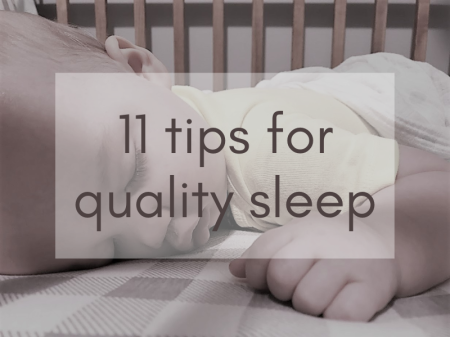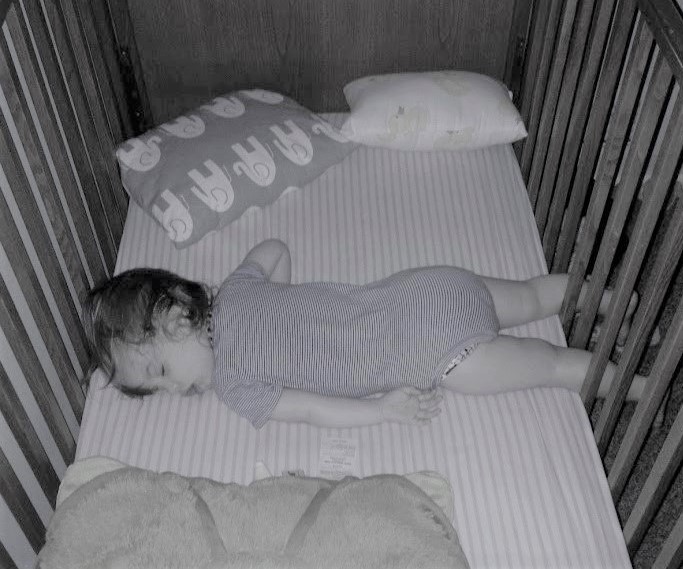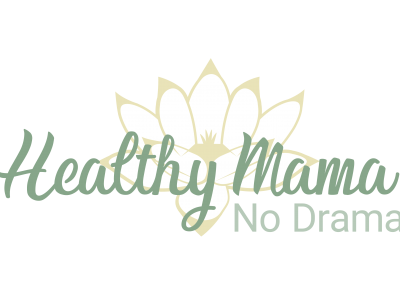A good night’s sleep. Sigh. Does that feel like a far-off dream because it’s been so long since you’ve had one? Did you know that quality sleep is actually just as important as regular exercise and a healthy diet? Research has shown that poor sleep has immediate negative effects on our hormones, exercise performance, and…believe it or not, brain function. You see, poor sleep can cause gut health issues. And, we know that our gut health is directly connected to our brain health. It’s a vicious cycle. But it totally makes sense! I’m sure you’ve heard of the term “mom brain.” Many people laugh it off as a joke, but if you know, you know. It’s a real thing! And this is the basic science to explain why it’s real. For more details on how your gut health and brain health are connected, along with causes and symptoms, check out Gut Health: The Shocking Truth.
Poor sleep can also cause weight gain and increase your risk for disease. In contrast, quality sleep can help you eat less, exercise better, and be healthier. So, I think we can all agree that a good night’s sleep is very important!!

Also, quick forewarning: I’ve noticed over the years that I enjoy taking pictures of my kids sleeping. They just look so peaceful…even when they’ve put themselves in what appears to be the most uncomfortable position. So, I decided to share some of my favorites with you today. Who knows, maybe seeing them sleeping so soundly will inspire you to get better sleep.
The growing problem
Are you getting the recommended 7-8 hours of sleep every night? Studies show that many aren’t. Which is sad, when you think about the fact that in today’s culture people are working longer hours and taking less vacation time. All the more reason to get good sleep when you’re able to sleep! But it’s not just the amount of sleep.
Quality of sleep is also important. When your body doesn’t receive enough restorative sleep, your health is significantly compromised. We’re talking your immune system, cognitive function, and even increased risk of disease. Yet, despite these facts, many people are not getting enough sleep. It’s all too common today for people to experience difficulty falling sleep and/or a poor quality of sleep.
If you want to optimize your health or lose weight, getting quality sleep is one of the most important things you can do, but one of the things often forsaken in order to achieve our goals. Lucky for you though, there are some simple changes you can make to help support better sleep.

1. Increase bright light exposure during the day.
Your body’s clock (circadian rhythm) affects your brain, body, and hormones, helping you stay awake and telling your body when it’s time to sleep. Natural sunlight (or bright light) during the day helps keep your circadian rhythm healthy, improve daytime energy, and improves the quality and duration of your nighttime sleep. So, take a few minutes to get outside and talk a short walk when it’s sunny! You’ll reap the benefits of getting some vitamin D while supporting a healthy immune system.

2. Keep your sleep environment as dark as possible.
This includes limiting lights from the television, computer screen and mobile devices. Light disrupts your body’s natural sleep rhythm.
3. Reduce blue light exposure in the evening.
Particularly two hours before bed. Again, this is due to its effect on your circadian rhythm, tricking your brain into thinking it’s still daytime. This reduces hormones like melatonin, which help you relax and get deep sleep. Electronic devices emit large amounts of blue light. If you are using electronic devices, consider wearing glasses that block blue light. There are so many options out there. Make sure to check the percent of blue light the glasses block. This is a great option. Or you can install apps that block the blue light on your device. I use lux on my computer (it’s free and works great!!), and for your smartphone, you’ll likely want to go into your phone’s settings to make some adjustments there.
4. Diffuse essential oils that promote relaxation.
Essential oils do more than just smell good or help support physical healing. In fact, inhaling essential oils is the fastest way to get them into your brain and start
receiving the benefits. And since your limbic system deals with emotions and stimulations, getting some direct sleep aid is a great support for quality sleep. Additionally, a research study showed that diffusing different essential oils at night can even improve memory in people age 50 and older.
Some great options are Lavender, Bergamot, Roman Chamomile, Sandalwood, Cilantro, Melissa, Thyme, or doTERRA’s Balance, Breathe, or Serenity blends. Some essential

oils for sleep need to be taken internally for their benefits. Petitgrain, Vetiver, and Roman Chamomile all can be taken internally to help soothe your body and prepare for sleep.*
Get my favorite essential oil diffuser blend recipes here.
5. Limit caffeine intake 6-8 hours before bedtime.
Caffeine stimulates your nervous system and may stop your body from naturally relaxing at night. Caffeine can stay elevated in your blood for 6–8 hours. Therefore, drinking large amounts of coffee after 3–4 p.m. is not recommended, especially if you’re sensitive to caffeine or have trouble sleeping.
6. Don't eat late in the evening.
Eating late at night may negatively affect both sleep quality and the natural release of HGH and melatonin. But, if you’re like me and that’s the only time you can snack in peace without little humans wanting you to share…maybe try some of these other options first! Or choose things that will support a good night’s sleep such as nuts, turkey, chamomile tea, passionflower tea or tart cherry juice.
7. Avoid alcohol near bedtime.
Alcohol may help you fall asleep, but once it wears off, it makes you more likely to wake up in the night. It’s known to cause or increase the symptoms of sleep apnea, snoring, and disrupted sleep patterns. It also alters nighttime melatonin production, which plays a key role in your body’s circadian rhythm. If you don’t want to avoid it altogether, consider minimizing consumption before bed if you’re having trouble sleeping.
8. Try to keep a consistent sleep schedule.
Back to the circadian rhythm, it functions on a set loop. Being consistent with your sleep and waking times can help with long-term sleep quality.
9. Exercise at the right time, and do the right type of exercise.
Exercise is one of the best science-backed ways to improve your sleep and health. It can help you fall asleep faster and sleep more soundly, but exercising too close to bed can
cause your brain to become too alert, ramp up your metabolism and body temperature, all of which will make it hard to fall asleep. Try to finish exercising at least three hours before bed or work out earlier in the day. Or, if you are going to exercise later in the day, opt for exercises that encourage relaxation and unwinding like yoga and stretching.

10. Don't watch the clock.
Whether it’s because you’re laying there trying to fall asleep for the first time, or trying to fall back asleep after waking up, all that staring at the clock will do is stress you out. So, if you can’t fall asleep after about 20 minutes, consider getting up and doing something relaxing like reading or listening to relaxing music until you’re able to fall asleep. Just make sure to keep the lights dim.
11. Herbs & supplements
Many will suggest melatonin, but I would actually advise against it. When we supplement with melatonin, it disrupts our body’s natural production of melatonin. This will only cause more issues down the road. Take particular precaution with kids as their bodies produce large amounts of melatonin.
You may have heard of other remedies such as tart cherry, magnesium, lavender, or valerian. My personal favorite supplement for a good night’s sleep is called Serenity. It utilizes the relaxing power of lavender essential oil along with natural plant extracts to promote restful sleep. Best part, there are no side effects like with many other sleep aids (like melatonin). It comes in 3 methods: an oil blend that you can apply topically and diffuse, a supplement with the addition of tart cherry, and a stick that you can rub on that includes the addition of valerian. Use one or, my

favorite, use all three. I’m not kidding when I tell you the Serenity products have blown my mind with how they support our sleep! And this coming from someone who didn’t even think she had any major issues with sleep!
If you’d like to try any of the Serenity products, use this link to receive 25% off.
As always, check with your medical professional first.
In short, your best bet for improving quality of sleep is to establish a routine that will support your sleep goals. Get lots of daytime bright light exposure, allow time to wind down and get away from screened devices, make sure your environment is supportive of sleep (dark and calming), and try to go to bed around the same time every night. Add the benefits of nature’s medicine to help your body and mind prepare for rest.

*These statements have not been evaluated by the Food and Drug Administration. This product is not intended to diagnose, treat, cure, or prevent any disease.
Some of the links above are affiliate links. This means that, at zero cost to you, I will earn an affiliate commission if you click through the link and finalize a purchase. Thanks for your support!
Resources:
Related posts:
- Preventative Health & Wellness It's great to have so many options at our fingertips today to address various health and wellness concerns. But, I think we can agree that being preventative with our health...
- Gut Health: The Shocking Truth A healthy gut is foundational to a healthy you. The human gut does more than just digest food and absorb nutrients. There's a reason it's called the second brain. Your...
- Anti-Inflammatory Diet One of the best ways to fight inflammation in your body does not come from a drug store. Instead, it comes from the grocery store. By simply choosing to incorporate...
- Why Essential Oils Are…Essential If you’ve done even a small amount of researching online about natural health, chances are that you’ve come across essential oils. Their popularity is ever-growing both in the natural world...


